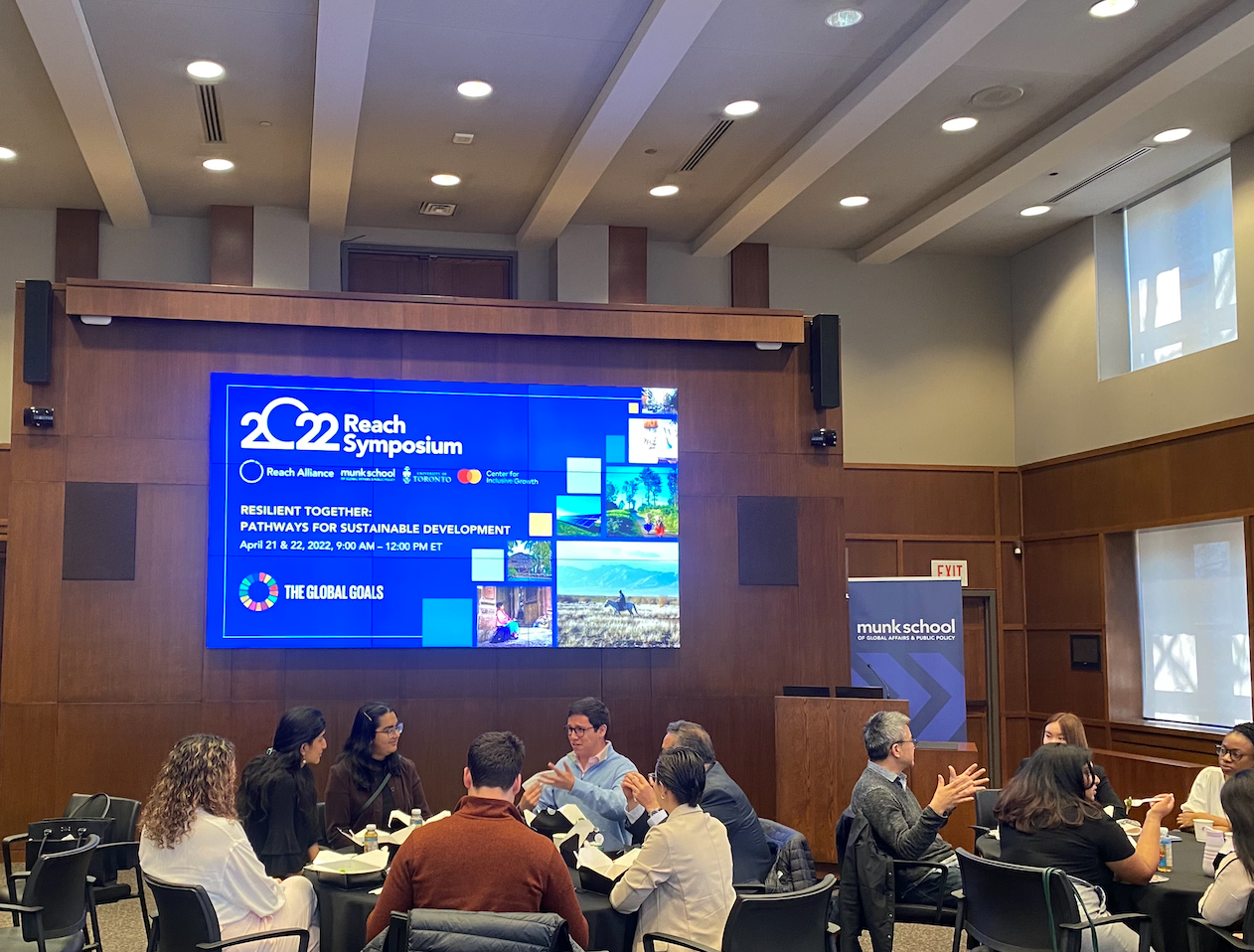
U of T’s Reach Alliance encourages resilience to accelerate the achievement of the UN’s Sustainable Development Goals
“The topic of this year’s Reach Symposium on resilience and adversity in the face of global shocks could not be more timely or relevant,” said University of Toronto President Meric Gertler in his opening remarks at the 2022 Symposium.
“The Reach Alliance’s [efforts to understand] how development practitioners can gain access to those who are the hardest to reach are vital to our success in enhancing global well-being and in lifting our most vulnerable populations out of extraordinary hardship.”
The annual Reach Symposium brings together student researchers, faculty mentors, development professionals and private sector partners to discuss how to achieve the Sustainable Development Goals (SDGs) and glean insights from interventions that have bolstered hard-to-reach populations.
At this year’s event, attendees discussed how individuals, organizations and institutions pivot in the face of challenges and remain resilient and steadfast in their commitment to ensuring that no one is left behind. From public to private partnerships and delivering vaccine provisions in rural indigenous communities, to building sustainable cities, the 2022 Symposium provided an opportunity for stakeholders to come together and exchange ideas, best practices and solutions in support of advancing the SDGs.
The Symposium also featured case studies from seven countries, with student researchers tackling what worked and what didn’t — and why.
What strategies underlie the resilience of Indigenous Mexicans living in irregular urban settlements? What prevented a promising network of solar-powered balloons from increasing the connectivity of remote populations in Peru? What’s behind the success of a portable prenatal care kit in reducing maternal mortality in Guatemala?

Source: Reach Alliance
A key insight from the seven case studies relayed at the Symposium was that to attain inclusive growth, solutions need to be cross-cutting and inclusive, involving various disciplines, sectors and contexts.
“One of the greatest insights from the research this year is that solutions to global problems are not one-shot answers — they are relationships that need to be maintained and sustained over the long term. We are only going to be able to do that if we align the different sectors, not just the incentives but the values and principles that bring different sectors together,” said Professor Joseph Wong, U of T’s vice-president, international and founder of the Reach Alliance.
But Reach is about far more than publishing and disseminating innovative research insights from students working across multiple disciplines. Founded in 2015 and housed at the Munk School, the Reach Alliance has recently expanded its academic consortium to include the University of Cape Town, Ashesi University, Singapore Management University and the University of Melbourne. The Alliance is now eight global universities strong, with original partners including the University of Toronto, Tecnológico de Monterrey, University College London and the University of Oxford.
Reach is steadily growing a worldwide network of researchers dedicated to uncovering real, tangible solutions to assist people living in extreme poverty, the administratively invisible and the geographically remote. Adding these new partners from universities across multiple continents will not only expand the breadth and depth of Reach’s research, it will also equip and empower the next generation of global leaders to create knowledge, inspire sustainable impact and foster international collaboration amongst students.
“As we think about how to reach the hardest-to-reach, the question is always changing. And having access to new institutions, those in various contexts, means that we can engage on the question through new dimensions. It also means that we are sharing new perspectives, services, and goods to reach the hardest-to-reach,” said Rushay Naik, a Reach alum who participated at the Symposium and worked on the 2018-19 Team Mongolia case study.
For universities joining the Alliance, the network provides an opportunity to have an impact beyond academic research.
“One of Tec’s priorities has always been the impact on society, “said Professor Iza Maria Sànchez of Tecnológico de Monterrey’s School of Government and Public Transformation. “An impact made by both students and teachers. Also, to give the students an opportunity for international exposure. Our participation in the Alliance allows us to do both.”
From the outset, the Reach Alliance partnered with the Mastercard Center for Inclusive Growth to help leverage the power of the private sector to ensure prosperity for all. Michael Froman, Mastercard’s vice chairman and president, strategic growth, was on hand at this year’s Symposium to explain how the Reach Alliance’s work fits their objectives.
“Our partnership with Reach is not only about an investment in knowledge and know-how,” Froman said, “but also an investment in the next generation of creative, principled, and committed leaders from around the world.”
The 2022 Reach Symposium concluded with one important message: to overcome current social and economic shocks, exhibit vigilance in the face of future disruption, and ensure the hardest-to-reach are not left behind, we must remain steadfast in our commitment and resilient in our approach.

